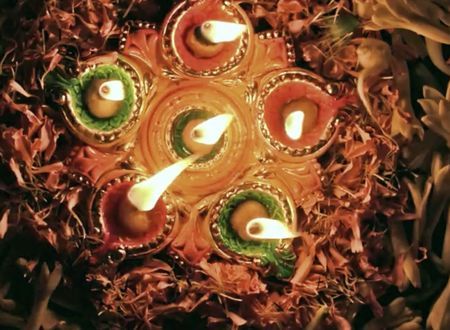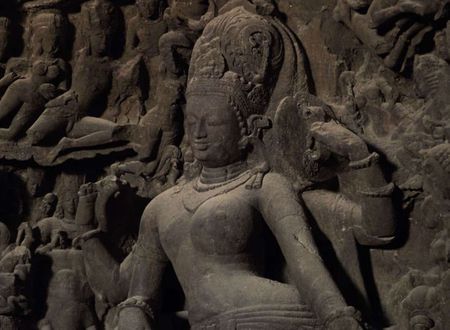Yaksha: What is the most astonishing fact in this world?
Yudhishtira: People see others dying every day. Yet they think they are immune from death; that they are immortal.
The Background
A Brahmana approached the Pandavas during their exile in the forest. “A deer ran away with my firewood, I can’t do my daily yajna. Please retrieve them for me”, the Brahmana appealed to the Pandavas. By virtue of being Kshatriyas, the Pandavas were duty-bound to protect anyone who came to them. Exiled or not.
They ran behind the deer and fired their arrows at it. But they couldn’t catch it. And the long chase took a toll on them and they were tired and thirsty. Yudhishtira asked Sahadeva to search for water. Sahadeva found a river that was a short distance away. As he was about to take a sip of water, a voice stopped him: “You must answer my questions before you can drink water from this river”. His throat parched with thirst, Sahadeva disregarded this threat and proceeded to drink the water. As soon as he finished drinking the water, he dropped dead.
Meanwhile, the other brothers wondered why Sahadeva hadn’t returned yet. Yudhishtira sent Nakula to look for Sahadeva. Nakula too found the river, and was shocked to see Sahadeva dead. The voice explained why Sahadeva died and repeated the same instructions to Nakula: he had to answer the questions before he could drink water. Nakula disregarded the voice and drank the water. He too dropped dead.
If I may fast forward some scenes, Arjuna and Bhima died the same way after disregarding the voice and drinking the water.
Yudhishtira came to the river. He was aghast on finding his brothers dead. And once again, the voice repeated the instructions. Unlike his brothers, Yudhishtira exercised fortitude, and he overcame his thirst and proceeded to answer the questions. He, however, asked the voice to identify itself. A yaksha appeared before Yudhishtira, and fired 100 questions at him.
Yaksha Prashnam
The questions posed by the Yaksha and the answers given by Yudhishtira constitute one of the most beautiful sections of Mahabharata. Known as Yaksha Prashnam, this section contains some of the most profound wisdom one can come across.
As an example, the Yaksha asks Yudhishtira what comes with a man even after he dies? Character, said Yudhishtira. What, if renounced, makes a person happy? Greed. What is the disease that is incurable? The answer is again greed!
Yudhishtira was a superb test-taker, he reeled off the answers capably as the Yaksha kept posing them. (This Wikipedia article gives a pretty good flavour of the Q & A between the Yaksha and Yudhishtira).
What is the Most Astonishing Fact in the World?
The Yaksha then asked Yudishtira what is the most astonishing fact in the world. Yudhishtira’s answer is truly beautiful. And thought-provoking.
People see others dying every day. Yet they think they are immune from death; that they are immortal.
Not Accepting Impermanence
In other words, people don’t accept impermanence. They live their life as if they live forever. Engaging in petty fights and squabbles. Wasting time over the non-trivial. Seeing the impermanent world as permanent. Assuming that the people around them will stay together forever. Pursuing ephemeral pleasures. Not asking the hard questions – Who am I? What is the purpose of my life?
We see from Yudhishtira’s statement that non-acceptance of permanence is a trait true in his times as well as ours. It appears to be a defect in our DNA. Just like the Kathopanishad Mantra which says that our inability to look inward is not our fault, but Brahma’s fault for making our senses point outward.
Ananta Rama Dikshitar, who gave several popular discourses in Tamil, mentioned the example of funeral vehicle drivers who transport the dead body to the cremation ground. They are in close proximity of death. If there is anyone who should be familiar with the concept of impermanence, it is these people, who see death day in and day out. We can be forgiven for naively assuming that they will be intimately familiar with the impermanent nature of the world. Yet, they are most concerned with when they will get their next gig – i.e. when will they get to see the next dead body, so that they get their income. Thus illustrating Yudhishtira’s point.
Memento Mori + Rogaan Iva Rasaayanam
Stoics have a saying Memento Mori, which is latin for “remember that you will die”. They keep reminding themselves of this throughout their lives. As Ryan Holiday’s writes in The Obstacle is the Way :
It’s a cliche question to ask, What would I change about my life if the doctor told me I had cancer? After our answer, we inevitably comfort ourselves with the same insidious lie: Well, thank God I don’t have cancer.
But we do. The diagnosis is terminal for all of us. A death sentence has been decreed.
In his beautiful text Atmabodha, Adi Sankara gives us the analogy of a course of medicine. In the same we have to take medicines for a long period of time for the disease to be cured, the “Aham Brahmasmi” (I am Brahman) thought, when repeated for long periods of time, will help change our identity. From the limited body-mind apparatus to the Eternal Self.
Rogaan Iva Rasaayanam. – Adi Sankara
Adi Sankara’s exercise of repeated reflection can be applied to Memento mori. By regularly reflecting on our mortality, on Memento Mori, we can accept impermanence. And we can then treat death as but the next adventure, as Albus Dumbledore said.
Flip the Script?
I love to dream. Of an ideal world. What if the entire world flipped the script, and reflected on Memento Mori? When Yudhishtira answers the question in such a world, he will say that the most astonishing thing is that people have embraced impermanence.
P.S. My thanks to Elena – she observed that the inability to accept permanence is part of the human condition. It is also thanks to her that I expedited posting this article.
Image Credit: Ben White from Unsplash









Comments & Discussion
33 COMMENTS
Please login to read members' comments and participate in the discussion.